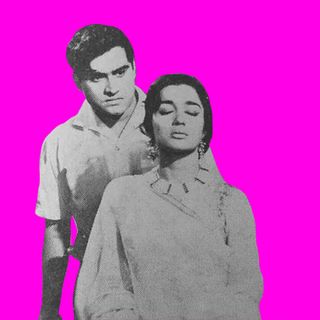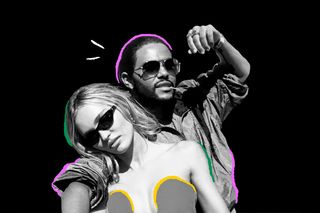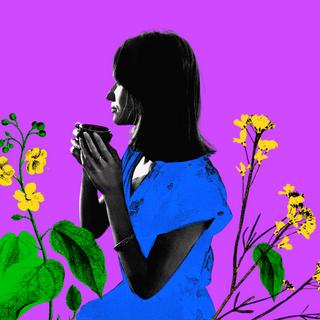
‘The Idol’ Is Proof of Hollywood’s Anti‑MeToo Backslide
The HBO show relishes in dismantling what it sees as the moral puritanism of MeToo, and framing exploitation as an exercise of agency.

Note: This article contains spoiler for season 1, episode 1 of ‘The Idol’
Somewhere near the halfway mark, Leila, the assistant/best friend, tells Jocelyn (played by Lily-Rose Depp) — the Britney Spears-Miley Cyrus surrogate of this story — that she hates Tedros (played by Abel ‘The Weeknd’ Tesfaye), the seedy nightclub owner, because of his rat tail hair and rape-y vibe. “Yeah, I kinda like that about him,” replies Jocelyn, smiling precociously at Leila, who just laughs and calls it gross. This is The Idol — HBO’s latest offering that brings Hollywood’s post-#MeToo era into sharp perspective. And not in a good way.
In 2017, when allegations of sexual abuse and rape cascadedonto Harvey Weinstein and several other high-profile figures in the Western media industry, it started conversations about power, dominance, and exploitation in the world of entertainment. This was followed by the cultural reckoning with how Britney Spears underwent a brutal conservatorship, in circumstances of the zeitgeist’s making. The general voyeurism built into the way the public consumed — almost literally — young women in the public eye led to many lives being altered by powerful men. The Idol tries to rewrite this reality by denying victimhood altogether.
Take the fact that, earlier in the episode, Jocelyn’s team tries to grapple with a leaked photo showing somebody had ejaculated on Jocelyn’s face. The whole conversation plays out like a gag: the record-label manager quipping “Who among us hasn’t had cum on our faces,” the assistant helplessly declaring she knew which men went into Jocelyn’s room but not which ones came on her face, and everyone else speculating on whether it was a selfie or not. This is a plot point that’s quickly brushed off — Jocelyn is unfazed by the eventual revelation and quickly moves on to go clubbing later, where she meets her Svengali character Tedros.
She later goes home and masturbates while choking herself — a scene that, when you really think about it, is perhaps meant to signal her masochistic tendencies, and maybe meant to explain away her nonchalance with her nudes being leaked.
Related on The Swaddle:
The 2018 Emmys’ Attempt to Reckon With #MeToo Was Painful to Watch
In another scene, an intimacy coordinator is swiftly dismissed by Jocelyn, who asserts agency over how she’d like her body to be shown. These are all meant to be moments that give us permission to eye-roll at Hollywood’s saccharine safeness post #MeToo, where everything is a problem and women’s agencies have supposedly been stifled in the process. There may be some truth to the argument that Hollywood’s efforts to rebuild in the aftermath of a paradigm-shifting movement against exploitation have sometimes been performative and shallow. But The Idol takes a position that seems to say that all corrective effort is insincere.
This is an injustice to the pop icons it claims to be representing. There is foreshadowing, as a Vulture article pointed out, that Jocelyn will die tragically in the end. The show might just end up being a critique of entertainment culture after all. But the first episode has set the tone for the creative choices to come and the narrative vehicle with which that message will be delivered. Is it just singular men like Tedros, who consume women within suffocating relationships, or is it all of us who are complicit in the fall of the Britneys of the world? The Idol seems to lean toward the former and, in doing so, lets Hollywood’s exploitation culture off the hook for its crimes.
If the end of the first episode is any indication, Tedros will likely isolate and trap Jocelyn into a parasitic relationship that preys on her trauma and impulse to self-destruct. The death drive of female pop stars is something audiences have relished for a long time. Last year, Blonde similarly claimed to depict Marilyn Monroe’s exploitation while participating in the same voyeurismthat ultimately destroyed her. In trying to make sense of damaged cultural icons in a post-MeToo world, Hollywood has arguably resorted to a questioning the #MeToo movement itself and the puritanism it has wrought in the larger culture. This narrative not only lacks nuance but also negates the fact that power works in complex ways that harm people across a spectrum of behaviours and motivations.
Perhaps one redeeming factor about the discourse around The Idol is that it’s been widely panned by critics and has an entertainingly teetering grip on the Rotten Tomatoes’ ratings. Many seem to agree: lingering on the body of a woman, whose exploitation is seemingly at the heart of the story, is not the best way to get that point across, especially if the context is that of showing her getting ready for a man we’re primed to believe is the antagonist.
Rohitha Naraharisetty is a Senior Associate Editor at The Swaddle. She writes about the intersection of gender, caste, social movements, and pop culture. She can be found on Instagram at @rohitha_97 or on Twitter at @romimacaronii.
Related


Sizzle This: Everyone’s Too Nostalgic For a Movie That Just Turned 10
